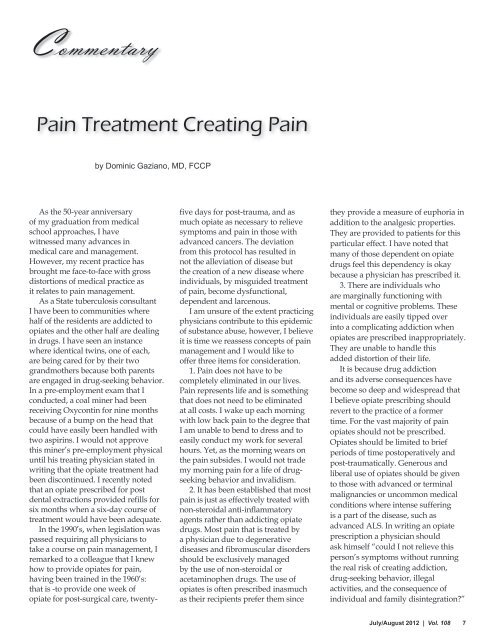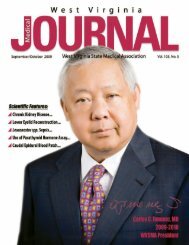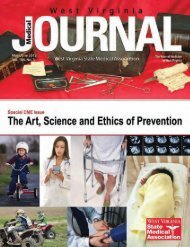Adam E. Klein, MD - West Virginia State Medical Association
Adam E. Klein, MD - West Virginia State Medical Association
Adam E. Klein, MD - West Virginia State Medical Association
Create successful ePaper yourself
Turn your PDF publications into a flip-book with our unique Google optimized e-Paper software.
CommentaryPain Treatment Creating Painby Dominic Gaziano, <strong>MD</strong>, FCCPAs the 50-year anniversaryof my graduation from medicalschool approaches, I havewitnessed many advances inmedical care and management.However, my recent practice hasbrought me face-to-face with grossdistortions of medical practice asit relates to pain management.As a <strong>State</strong> tuberculosis consultantI have been to communities wherehalf of the residents are addicted toopiates and the other half are dealingin drugs. I have seen an instancewhere identical twins, one of each,are being cared for by their twograndmothers because both parentsare engaged in drug-seeking behavior.In a pre-employment exam that Iconducted, a coal miner had beenreceiving Oxycontin for nine monthsbecause of a bump on the head thatcould have easily been handled withtwo aspirins. I would not approvethis miner’s pre-employment physicaluntil his treating physician stated inwriting that the opiate treatment hadbeen discontinued. I recently notedthat an opiate prescribed for postdental extractions provided refills forsix months when a six-day course oftreatment would have been adequate.In the 1990’s, when legislation waspassed requiring all physicians totake a course on pain management, Iremarked to a colleague that I knewhow to provide opiates for pain,having been trained in the 1960’s:that is -to provide one week ofopiate for post-surgical care, twentyfivedays for post-trauma, and asmuch opiate as necessary to relievesymptoms and pain in those withadvanced cancers. The deviationfrom this protocol has resulted innot the alleviation of disease butthe creation of a new disease whereindividuals, by misguided treatmentof pain, become dysfunctional,dependent and larcenous.I am unsure of the extent practicingphysicians contribute to this epidemicof substance abuse, however, I believeit is time we reassess concepts of painmanagement and I would like tooffer three items for consideration.1. Pain does not have to becompletely eliminated in our lives.Pain represents life and is somethingthat does not need to be eliminatedat all costs. I wake up each morningwith low back pain to the degree thatI am unable to bend to dress and toeasily conduct my work for severalhours. Yet, as the morning wears onthe pain subsides. I would not trademy morning pain for a life of drugseekingbehavior and invalidism.2. It has been established that mostpain is just as effectively treated withnon-steroidal anti-inflammatoryagents rather than addicting opiatedrugs. Most pain that is treated bya physician due to degenerativediseases and fibromuscular disordersshould be exclusively managedby the use of non-steroidal oracetaminophen drugs. The use ofopiates is often prescribed inasmuchas their recipients prefer them sincethey provide a measure of euphoria inaddition to the analgesic properties.They are provided to patients for thisparticular effect. I have noted thatmany of those dependent on opiatedrugs feel this dependency is okaybecause a physician has prescribed it.3. There are individuals whoare marginally functioning withmental or cognitive problems. Theseindividuals are easily tipped overinto a complicating addiction whenopiates are prescribed inappropriately.They are unable to handle thisadded distortion of their life.It is because drug addictionand its adverse consequences havebecome so deep and widespread thatI believe opiate prescribing shouldrevert to the practice of a formertime. For the vast majority of painopiates should not be prescribed.Opiates should be limited to briefperiods of time postoperatively andpost-traumatically. Generous andliberal use of opiates should be givento those with advanced or terminalmalignancies or uncommon medicalconditions where intense sufferingis a part of the disease, such asadvanced ALS. In writing an opiateprescription a physician shouldask himself “could I not relieve thisperson’s symptoms without runningthe real risk of creating addiction,drug-seeking behavior, illegalactivities, and the consequence ofindividual and family disintegration?”July/August 2012 | Vol. 108 7















